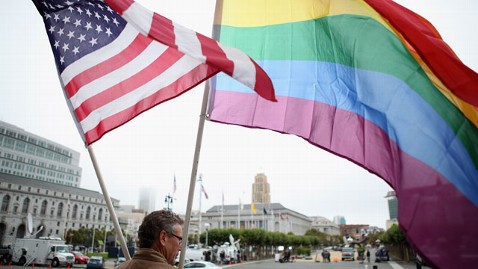Washington Approves Same-Sex Marriage, Marking Shift in Nation's Views

Justin Sullivan/Getty Images)
On Thursday, opponents of the same-sex marriage referendum on the ballot in Washington state conceded the race, marking a full slate of victories for gay rights on Election Night. Same-sex marriage was legalized by popular vote for the first time in our nation's history in not one, but all three states where it was on the ballot: Maine, Maryland and Washington. In Minnesota, a proposed ban on same-sex marriage that would have defined marriage as between one man and one woman in the state's constitution was defeated.
Tuesday's victories mark more than just a win for the gay rights movement; they represent a larger demographic shift in our country. In an election year where the president made history by publicly announcing his support for same-sex marriage - becoming the first sitting president to do so - the results in Maine, Maryland, Washington and Minnesota appear to be another sign of this increased acceptance.
Get more pure politics at ABCNews.com/Politics and a lighter take on the news at OTUSNews.com
This year, national polling has shown historical highs for same-sex marriage support. An ABC News/Washington Post poll released in May 2012, shortly after President Obama announced his support in an interview with ABC's Robin Roberts, showed 53 percent of Americans believe gay marriage should be legal and 36 percent say they "strongly" support it. Thirty-two percent say they were "strongly opposed." It marks the first time strong sentiment tilted positive in ABC/Washington Post polling on the issue.
Several other polls released in the spring and summer showed a plurality of support for same-sex marriage in the country as well. A CNN/ORC poll released in June showed 54 percent of Americans support the legalization of same-sex marriage. A Gallup poll taken in May showed 50 percent of Americans supporting it, and an NBC/Wall Street Journal poll in May showed that 54 percent of Americans would support legalizing same-sex marriage in their state.
The reason for the increasing acceptance of gay marriage is likely linked to an increased exposure to gay people. The ABC/Washington Post taken in May found that 71 percent of Americans have a family member, friend or acquaintance who is openly gay - a strong majority, and a jump from 58 percent in 1998. The increased exposure can best be seen in the attitudes of young people.
"To young people, being gay is like being left-handed - they don't get what the big deal is," ABC's George Will said on Election Night.
Currently there appears to be a deep partisan divide on the issue, with Republicans generally opposed to legalizing same-sex marriage and Democrats generally in favor. This divide was highlighted in the exit polls from Maine, Maryland and Washington on Tuesday.
In Maine, 81 percent of those who voted in favor of same-sex marriage also voted for President Obama while 69 percent of those who voted "no" went for Romney. In Washington the breakdown was similar: 85 percent of those who voted to approve same-sex marriage voted for Obama, while 74 percent of those who voted to reject the measure voted for Romney. In Maryland 78 percent of the "yes" vote was for Obama, 55 percent of the "no" vote was for Romney.
But if the trend continues - if same-sex marriage support continues to grow and more states continue to legalize it - the Republican party will need to do some soul-searching, so to speak, on the issue. Voters 18 to 29 only made up 19 percent of the voting block in 2012, and for all the talk about how the youth vote propelled Obama in 2008, they only made up 18 percent of voters that year. But if one thing is certain, it's that younger people will grow up, and as that happens, they'll begin to account for a larger share of the voting block - one neither party can afford to lose.